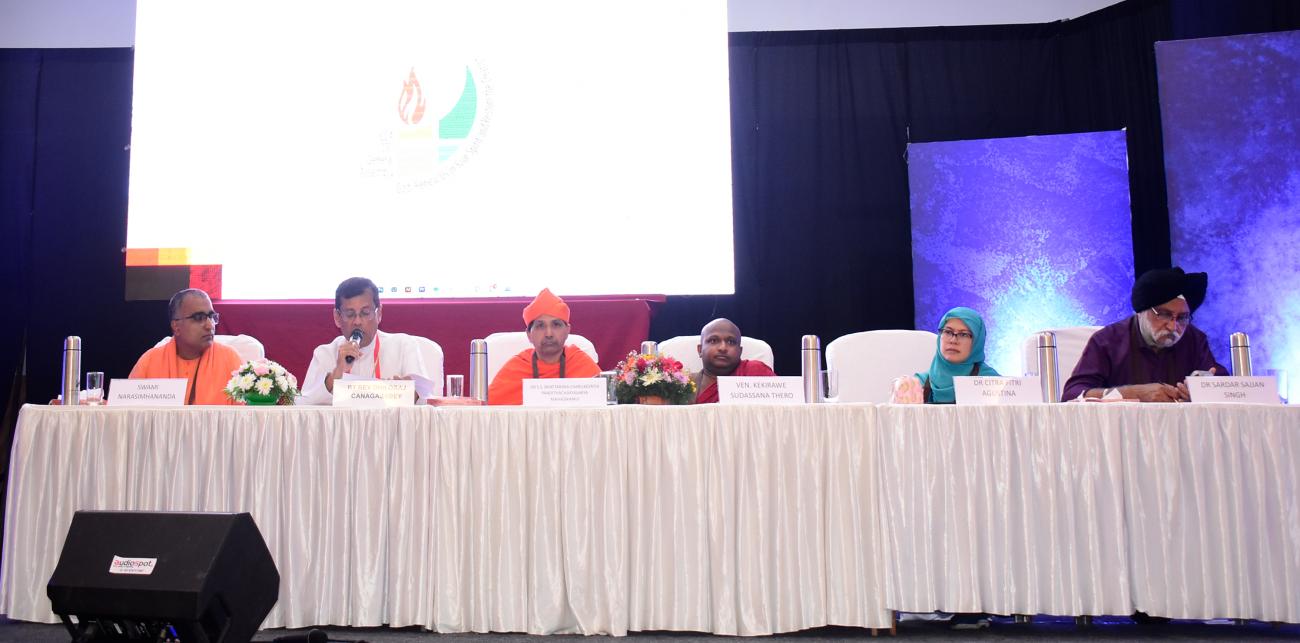Asian Inter-Religious leaders underscore the necessity of dwelling in harmony

Kottayam, India: At a special interfaith panel session during the 15th General Assembly of the Christian Conference of Asia (CCA), leaders from six religious traditions, namely Buddhism, Christianity Hinduism Islam, Jainism, and Sikhism affirmed the necessity of dwelling in harmony with creation as essential to restoring and renewing the whole creation.
Ven. Kekirawe Sudassana Thero, a Sri Lankan Buddhist Bhikku, from the Department of Pali and Buddhist Studies, University of Kelaniya, Sri Lanka profoundly remarked, “What is lacking in the world today is loving-kindness or goodwill. Material gain in itself can never bring lasting happiness and peace. Peace must first be established in man’s own heart before he can bring peace to others and to the world at large.”
To overcome contemporary challenges and tensions between environmental protection and economic development, Ven. Kekirawe presented four principles of Buddhist philosophy: human morality, spiritual development, a non-attached and non-confrontational attitude towards the natural world, and a balanced relationship between humans and nature.
His Holiness Dr Swasti Shree Bhattaraka Charukeerthi Pandithacharyavarya Mahaswamiji, an eminent Jain sage who holds the seat of the Bhattaraka, stressed the importance of tolerance and education to promote global development and harmony. The nine fundamentals, or nav tatvas in Jainism, describe the relationships and responses a person has with the outer world. One could avoid the influx of bad karma and stay in peace while living a worldly life by developing friendship or amity towards all living beings, admiring their success, accompanying them in distress, and leaving them alone when they do not understand what is right or wrong.
Dr Sardar Sajjan Singh, the Convenor of the Sikh Heritage Foundation, who is deeply involved in the promotion of Sikhism and Sikh philosophy said, “As weak beings, we are full of attachments and desires. In a world of illusion or Maya, we forget the Creator, while engrossed in His Creation. It is only with His Grace and complete surrender to His will that one can overcome evils like anger, greed, attachments, and desires,” shared the Sikh scholar. Dr Singh provided several excerpts from the Jaap Sahib and the Guru Granth Sahib which demonstrated that the Sikh concept of ultimate reality or God was more akin to the Judaic notion of an Almighty person than to the Aryan concept of an imminent neutral principle.
Swami Narasimhananda, a Hindu monk of the Ramakrishna Math and Ramakrishna Mission explained the Hindu perspective on dwelling in harmony with creation. Swami Narasimhananda illustrated that Hinduism is a religion that places a strong emphasis on the harmony between nature, human needs, and spirituality. The interconnectedness of all things is at the core of Hindu Dharma, which promotes balance and harmony between all aspects of creation. The natural elements as well as the sun, moon, and rivers acknowledge the interconnectedness of humans and nature. This helps human beings to cultivate a deeper appreciation for the natural world and our place within it. Hinduism also promotes a balance between individual and communal needs which promotes dwelling in harmony.
Dr Citra Fitri Agustina, a Muslim leader from the largest Islamic organisation in Indonesia, the Nahdlatul Ulama (NU), and a mental health specialist, introduced NU, and its practice of the values of tasamuh (tolerance), tawassuth (moderation), I’tidal (consistency), and tawazun (harmony). Although Islam has multiple interpretations, a humanitarian interpretation, focusing on Rahmah, loosely translated as ‘love and compassion’ was emphasised.
The panel session was an opportunity for the rich exchange of ideas, core values, and opinions from different Asian religions, which provided nuanced perspectives to the participants of the 15th CCA General Assembly on dwelling in harmony with creation and the necessity of interfaith actions for the ecological crisis.
The interfaith panel session was chaired by Bishop Dhiloraj R. Canagasabey, and he underscored the Christian values of the unity and harmony of all God’s creation.
For more photos (photo gallery) please click here: Thematic Presentation – III “Interfaith Perspectives on Renewal and Restoration of Creation: Dwelling in Harmony', 30 September 2023










